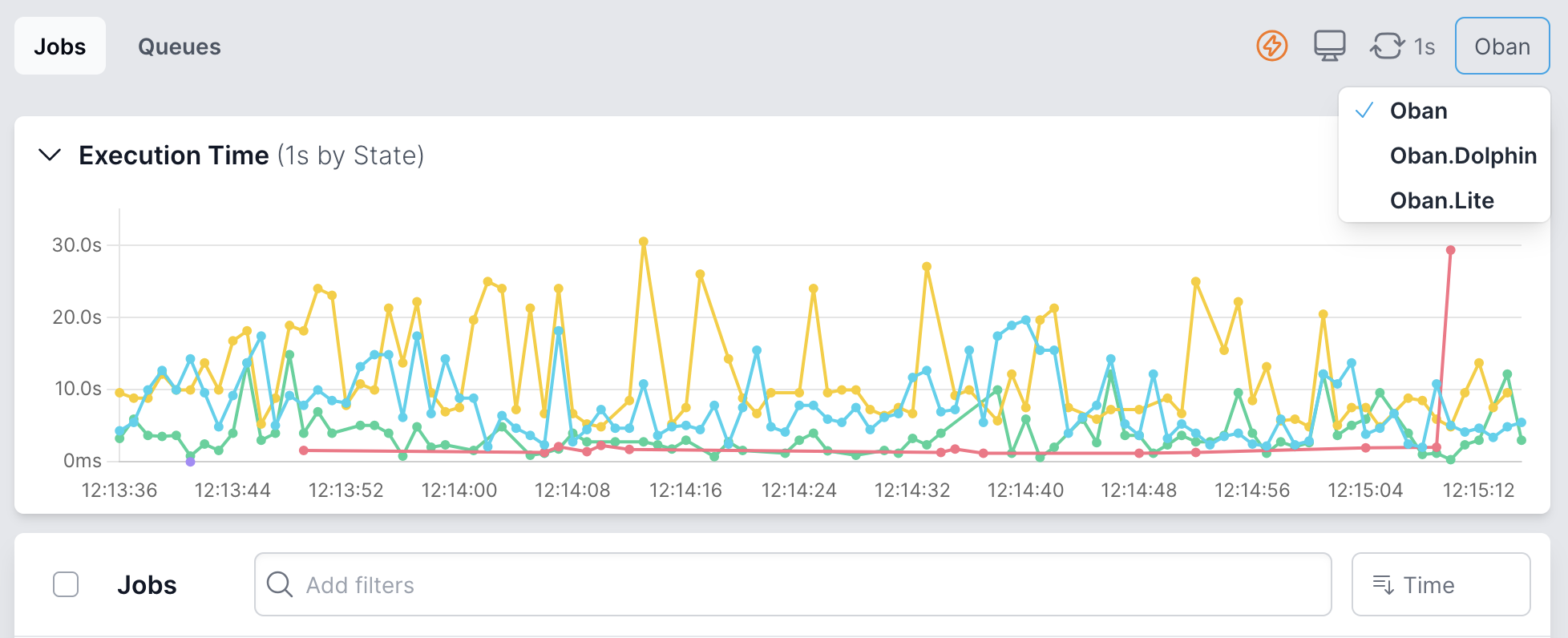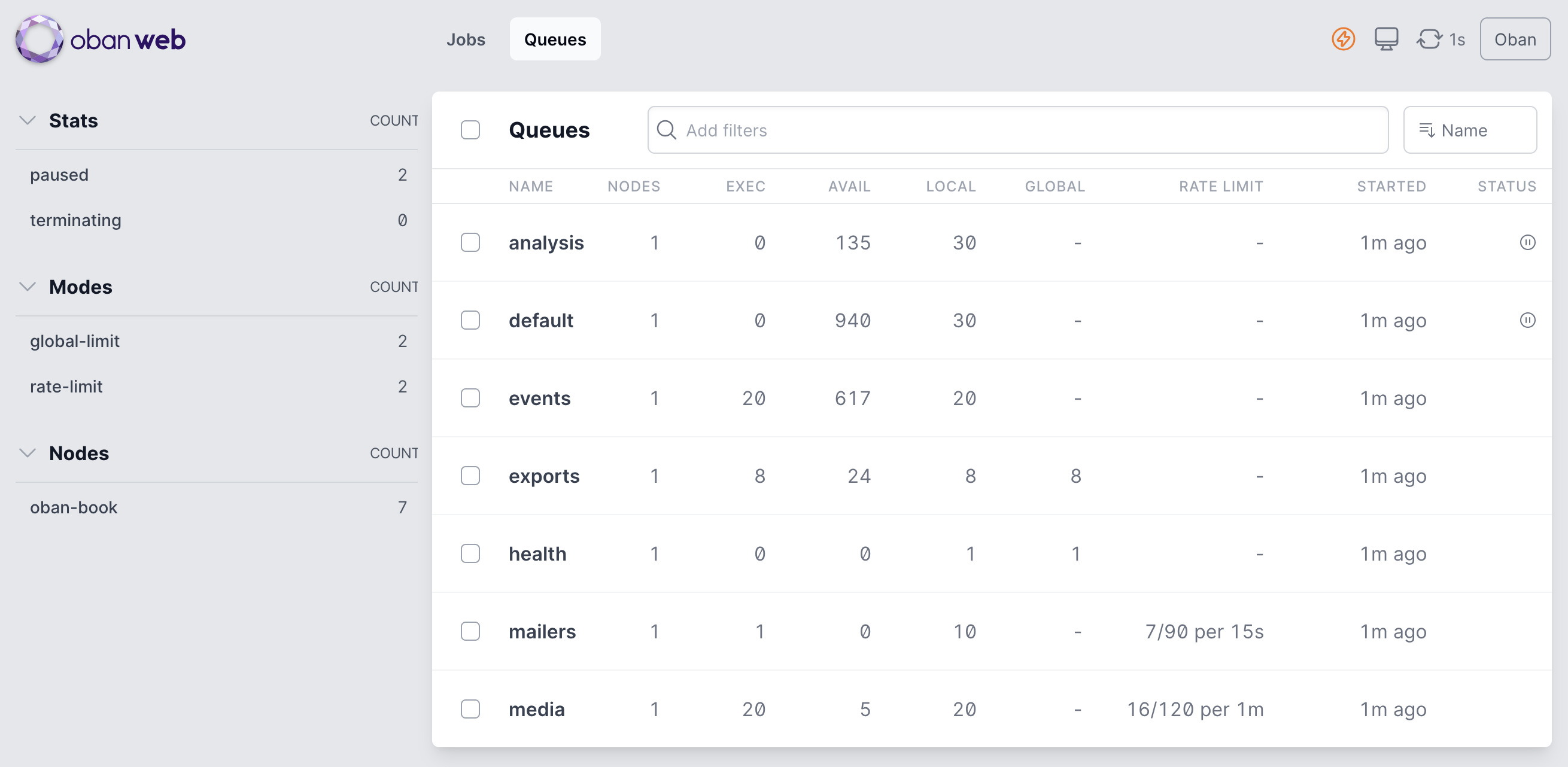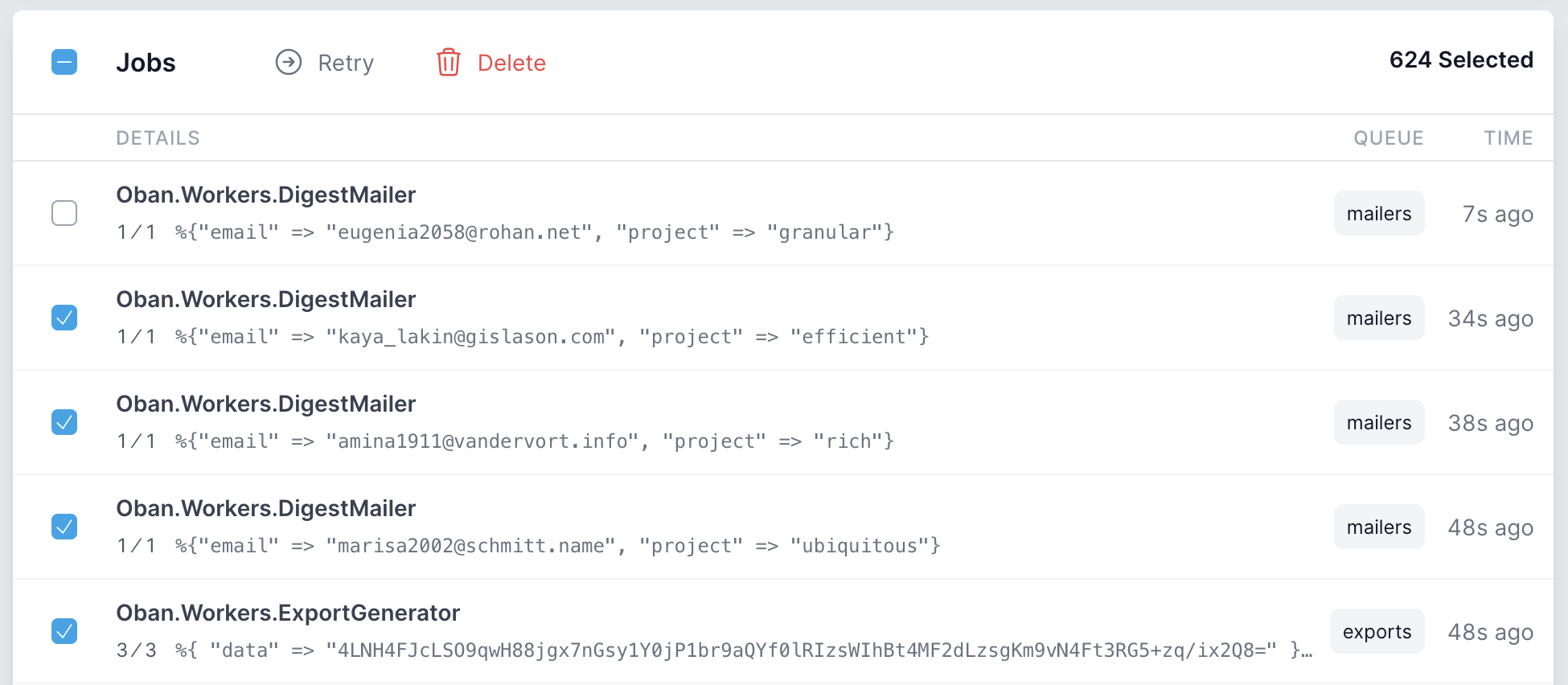The title doesn't relay the depth of this announcement, but it is short, balanced, and looked good to us. From open sourcing multiple packages, to releases with features like MySQL support, to plan changes—it's immense.
Open Sourcing Oban Web
📯 Oban Web is now open source and free (as in champagne 🥂)! From now on, Oban Web will be published to Hex and available for use in all your Oban powered applications.
Why? Here's some history.
Our original Oban announcement on the Elixir Forum included a screenshot of Oban Web. That was nearly six years ago now, and boy have we come a long way. Originally launched as a private beta, Web was our first foray into building a viable business model for Oban. Years ago we realized our customers needed a more complex set of tools. Thus, we released Oban Pro. Pro is where the serious business happens now, and we want more people to have Web available from the start.
If you're a current customer, or wonder what this means for our existing subscriptions, bounce to the Simplified Plans section.
Let's cover Oban v2.19 first, then get back to more Web news.
Oban v2.19
The latest Oban release includes a new database engine, an installer for improved UX, better logging, and more. Here are some of the highlights.
🐬 MySQL Support
Oban officially supports MySQL with the new Dolphin engine. Oban works with modern (read "with
full JSON support") MySQL versions from 8.4 on, and has been tested on the highly
scalable Plantescale database.
Running on MySQL is as simple as specifying the Dolphin engine in your configuration:
config :my_app, Oban,
engine: Oban.Engines.Dolphin,
queues: [default: 10],
repo: MyApp.Repo
With this addition, Oban can run in an estimated 10% more Elixir applications!
⚗️ Automated Installer
Installing Oban into a new application is simplified with a new igniter powered mix task.
The new oban.install task handles installing and configuring a standard Oban installation, and
it will deduce the correct engine and notifier automatically based on the database adapter.
mix igniter.install oban
This oban.install task is currently the recommended way to install Oban. As a bonus, the
task composes together with other igniter installers, making it possible to install phoenix and
oban with a single igniter.new command:
mix archive.install hex igniter_new
mix igniter.new oban_demo \
--with phx.new \
--with-args="--database postgres" \
--install oban
📔 Logging Enhancements
Logging in a busy system may be noisy due to job events, but there are other events that are
particularly useful for diagnosing issues. A new events option for attach_default_logger/1
allows selective event logging, so it's possible to receive important notices such as notifier
connectivity issues, without logging all job activity:
Oban.Telemetry.attach_default_logger(
events: ~w(notifier peer stager)a
)
Along with filtering, there are new events to make diagnosing operational problems easier.
A peer:election event logs leadership changes to indicate when nodes gain or lose leadership.
Leadership issues are rare, but insidious, and make diagnosing production problems especially
tricky.
[
message: "peer became leader",
source: "oban",
event: "peer:election",
node: "worker.1",
leader: true,
was_leader: false
]
Activity for all official plugins is now logged via plugin:stop and plugin:exception events.
That includes runtime information to help monitor activity and diagnose issues. For example, every
time Cron runs successfully it will output details about the execution time and all of the
inserted job ids:
[
source: "oban",
duration: 103,
event: "plugin:stop",
plugin: "Oban.Plugins.Cron",
jobs: [1, 2, 3]
]
There are other notable changes such as the new Oban.check_all_queues/1 function, starting
queues in parallel on init, and official JSON integration. Read more in the full
Changelog.
Oban Web v2.11
Beyond preparations for open sourcing, Web v2.11 includes substantial work toward component cleanup and unification. Here are some of our favorite new features:
🐬🪶 MySQL and SQLite
All official engines are fully supported. Listing, filtering, ordering, and searching through jobs
works for Postgres, MySQL, and SQLite. That includes the particularly gnarly issue of dynamically
generating and manipulating JSON for filter auto-suggestions! Nested args queries, such as
args.address.city:Edinburgh work equally well with each engine.
🎛️ Instance Select
The dashboard will now support switching between Oban instances.

A new instance select menu in the header allows switching between running Oban instances at runtime. There's no need to mount additional dashboards in your application's router to handle multiple instances. The most recently selected instance persists between mounts.
- oban_dashboard "/oban_a", oban_name: Oban.A
- oban_dashboard "/oban_b", oban_name: Oban.B
- oban_dashboard "/oban_c", oban_name: Oban.C
+ oban_dashboard "/oban"
This also eliminates the need for additional router configuration. The dashboard will select the
first running Oban instance it finds (with a preference for the default Oban).
- oban_dashboard "/oban", oban_name: MyOban
+ oban_dashboard "/oban"
☯️ Rebuilt Queues Page
The queue and jobs tables are fully rebuilt with shared, reusable components and matching functionality.

This enables far more powerful interaction with queues:
-
Uniform Navigation - click on any part of the queue row to navigate to details.
-
Sidebar - a new queue sidebar shows status counts and enables filtering by statuses such as
pausedorterminating. -
Filtering - queues are auto-complete filterable just like jobs, making it possible to find queues running on a particular node or narrow down by status.
-
Shared Sorting - queue sorting now behaves identically to jobs, through a shared dropdown.
-
Condensed Rows - simplify the queue page by removing nested row components. Extra queue details are in the sub-queue page.
🕯️ Operate on Full Selection
Apply bulk actions to all selected jobs, not just those visible on the current page.

This expands the select functionality to extend beyond the current page and include all filtered jobs, up to a configurable limit. The limit defaults to 1000 and may be overridden with a resolver callback.
🪪 Licensing and Installation
Oban Web v2.11 is licensed under Apache 2.0, just like Oban and Elixir itself. Previous versions are commercially licensed, therefore private, and won't be published to Hex.
See the updated, much slimmer, installation guide to get started.
Oban Met v1.0
Oban Met is the secret sauce that powers the charts and runtime details shown in the Oban Web dashboard. It is a distributed, compacting, multidimensional, telemetry-powered time series datastore (Zang!) for Oban that requires no configuring. It gathers data for queues, job counts, execution metrics, active crontabs, historic metrics, and more.
Web is virtually useless without Met, so we've open sourced it as well ✨!
While Met is designed for use with Web, it's still mighty useful on its own for accessing runtime metrics and counts. Take a look at the docs for some useful examples.
Simplified Plans
As of today, Web and Web+Pro subscriptions are no longer available. Only Oban Pro.
Existing web subscriptions and license keys will continue working until you upgrade Web to v2.11+. However, you'll continue paying for your subscription until you're ready to upgrade (those are private packages that we're serving still).
Legacy web customers will receive an email with an exclusive coupon to upgrade to Pro continue receiving support and to beneift from lush features such as: workflows, chunks, decorators, structured args, hooks, global limits, dynamic plugins, and much more.
Special thanks to all of our customers ❤️🔥 that supported Oban and its ecosystem for the past five years. You are integral to us making open source Oban, and now Web, possible.
As usual, if you have any questions or comments, ask in the Elixir Forum. For future announcements and insight into what we're working on next, subscribe to our newsletter.
